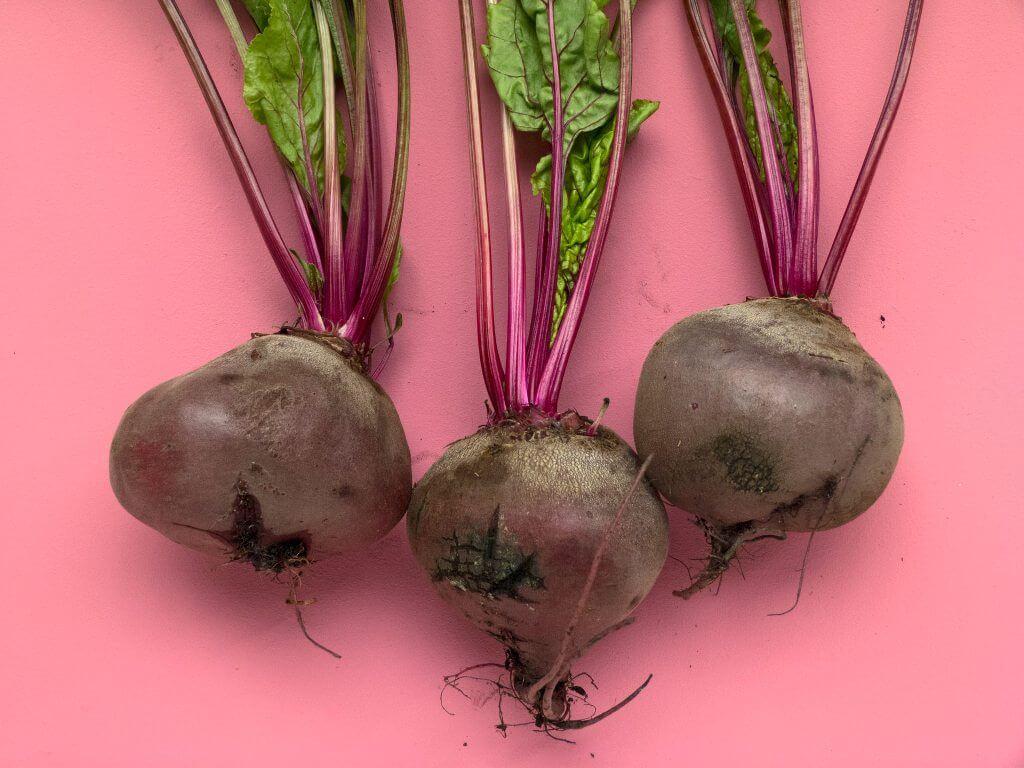Uncover the natural wonder of beetroot and its incredible benefits during menopause. Dive into a world of wellness with this superfood.
Consumer demand for plant-based superfoods has surged recently, but many of these foods originate from distant lands. While import regulations are stringent, ensuring consistent quality can be a challenge.
One such superfood is beetroot, which has gained popularity in the diets of individuals seeking weight loss and athletes. Incorporating beetroot into your diet can offer numerous benefits, notably its rich nitrate content, which enhances physical performance.
Additionally, its low-calorie profile makes it a preferred choice for those on a weight loss journey. Furthermore, beetroot effectively addresses concerns like cellulite by facilitating the elimination of excess fluids and toxins. Discover the advantages of beetroot for women in midlife during menopause.
According to scientific research: “Nitrates are used by athletes to improve their performance because the “Beetroot juice increases levels of nitric oxide (NO), which serves multiple functions related to increased blood flow, gas exchange, mitochondrial biogenesis and efficiency, and strengthening of muscle contraction.”
Beetroot: A nutrient-rich superfood for midlife women
Discover the nutritional treasure trove found in beetroot. Packed with essential vitamins (A, B, and C) and vital minerals (sodium, potassium, zinc, magnesium, iron, and boron), beetroot offers a range of health benefits for women navigating the midlife journey. From supporting skin health to aiding in hormone production during menopause, explore the advantages of including this vibrant root vegetable in your diet.
This vibrant root vegetable is rich in essential vitamins and minerals, including:
- Vitamin A: Beneficial for maintaining healthy skin, vision, and the immune system.
- Vitamin B: A group of vitamins that support energy metabolism, brain function, and overall well-being.
- Vitamin C: Known for its antioxidant properties, vitamin C aids in collagen production, immune system support, and skin health.
In addition to vitamins, beetroot is abundant in essential minerals, including:
- Sodium: Vital for maintaining proper fluid balance in the body.
- Potassium: Essential for heart health, muscle function, and regulating blood pressure.
- Zinc: Supports immune function, wound healing, and DNA synthesis.
- Magnesium: Crucial for muscle and nerve function, blood glucose control, and bone health.
- Iron: Necessary for transporting oxygen in the blood and preventing fatigue.
- Boron: An essential mineral involved in producing sex hormones, which can be particularly relevant during menopause.
Incorporating beetroot into your diet can provide these essential nutrients, contributing to overall health and well-being, especially during midlife and menopause.
Unlocking beetroot’s health benefits for you
Beetroot isn’t just a vibrant veggie; it’s a powerhouse of antioxidants, essential vitamins, and vital minerals that contribute to your overall well-being. Dive into the world of beetroot benefits:
- Radiant Skin: Rich in antioxidants, beetroot helps maintain skin elasticity and shields against harmful UV radiation, keeping your skin youthful and glowing.
- Heart Health: The flavonoids and carotenoids in beetroot act as antioxidants that lower bad cholesterol (LDL) and boost good cholesterol (HDL). Its mineral content, including heart-friendly beta minerals, further supports cardiovascular health.
- Quality Sleep: Beetroot consumption aids in combating anaemia while enhancing oxygen circulation throughout your body. Experience improved restfulness, bidding farewell to restlessness and insomnia.
- Sharper Memory: Abundant in nitrates, beetroot becomes nitric oxide, enhancing blood flow to your brain’s frontal lobes. This boost helps protect your memory and staves off cognitive decline.
Beetroot juice is beneficial for menstrual and menopausal disorders. It is much better than taking drugs or synthetic hormones that always create some consequences.
Discover the many ways beetroot can enrich your health and vitality.
Delicious and easy ways to incorporate beetroot into your diet
Microwave: If you never have time to cook, the microwave could be a perfect solution. Program the microwave at 750 watts (or at your tested power). Place the beetroot in a microwave-safe container, pour 1/4 cup of tea or water and cover with the microwave lid. Switch on the microwave and start for 10 minutes. Then at the end of the cooking, remove the container from the microwave and let it rest for at least twenty minutes.
Boiled: Boiled and bland beetroot isn’t dull. First, wash the beets and don’t remove the peel as this preserves its colour. Place in a pan and cover with water, bring to the heat for 30 minutes.
Roasted: Simple roasted it’s an easy way to eat that without losing the flavour. In only three steps, you can prepare a portion of delicious food. First, don’t peel them. Secondly, wash carefully before wrapping in aluminium foil. Finally, place them on the oven (200 degrees) for about an hour.
Raw: Instead of cooking or boiling beetroot why not eat them raw? When you cook beets, brittle nutrients may disintegrate at high temperatures. Eating raw red beets is the best way to get full beetroot benefits.
Exploring the wonders of beetroot juice in your menopausal diet
Beetroot, an age-old vegetable revered for its medicinal properties, has stood the test of time. What the Romans once used to combat fever and as a gentle laxative, modern science now validates as a nutritional powerhouse. Explore the wealth of benefits that beetroot juice brings to your diet:
- Mind and Body Booster: Incorporating more beets into your diet can potentially extend your lifespan. Packed with essential nutrients, beetroot is a recipe for vitality and longevity.
- Dietary Enhancement: Beetroot is ideal for those seeking a balanced diet and effective weight management. Low-calorie content supports your weight loss goals while keeping your diet nutritious.
- Digestive Wellness: Fresh beetroot juice, complete with its pulp, is a natural source of dietary fibre. It plays a crucial role in regulating digestion and relieving constipation, making it a go-to home remedy for an upset stomach.
- Anti-Aging Ally: Regular beetroot consumption safeguards your health from within. Loaded with eight antioxidants, beetroot combats free radicals, while vitamin C promotes collagen production and enhances iron absorption, contributing to a youthful appearance.
- Natural Detox: Beetroot’s unique betalains deliver powerful antioxidants, anti-inflammatory benefits, and detoxification properties. Compounds like methionine and glycine prevent fatty acid buildup and stimulate liver cell regeneration, promoting a healthy detox process.
- Enhanced Stamina: Drinking beetroot juice elevates plasma nitrate levels, improving physical performance and enhancing exercise stamina.
- Liver Love: Beetroot juice bolsters liver function, aiding toxin removal from the body. The antioxidant glutathione safeguards the liver, fosters cell regeneration, and enhances fat synthesis.
Embrace the many advantages of beetroot juice, as it elevates your diet and supports your overall well-being.
Potential side effects of beetroot
Beetroot is generally well-tolerated by most individuals. However, there are a few considerations to keep in mind:
- Kidney Stone Risk: Individuals prone to kidney stone formation may need to moderate their beetroot consumption. Be aware that beetroot contains oxalates, compounds that can contribute to kidney stone development. Consult with a healthcare professional if you have concerns.
- Irritable Bowel Sensitivity: For those with irritable bowel syndrome (IBS) or sensitivities, it’s advisable to limit beetroot intake. Red beetroot contains fructans, which can sometimes exacerbate IBS symptoms. If you have questions or uncertainties, seek guidance from your healthcare provider.
Incorporating beetroot into your diet can offer numerous health benefits, but it’s essential to be mindful of these potential side effects if you have specific health conditions or sensitivities. Always consult with a medical professional for personalized advice and recommendations.
Easy beetroots recipes
Apple, beetroot, and ginger juice
Ingredients:
- 2 medium-sized beetroots, washed and peeled
- 2 apples, cored and chopped
- 1-inch piece of fresh ginger, peeled
- 1 lemon, peeled (optional for added zing)
Instructions:
- Cut the beetroots, apples, and ginger into smaller pieces to fit into your juicer.
- Add the beetroot, apple, ginger, and lemon (if desired) to your juicer.
- Turn on the juicer and process all the ingredients until you have a smooth, vibrant juice.
- Pour the juice into a glass, and if preferred, add ice cubes for a refreshing touch.
- Serve immediately, and enjoy your nutritious apple, beetroot, and ginger juice!
Beetroot and carrot juice
Ingredients:
- 2 beetroots, washed and peeled
- 3 carrots, washed and peeled
- 1 apple, cored
- 1 lemon, peeled (optional)
Instructions:
- Prepare the beetroots, carrots, apple, and lemon (if desired) for juicing.
- Cut the beetroots, carrots, and apples into smaller pieces to fit into your juicer.
- Add all the prepared ingredients to your juicer.
- Turn on the juicer and process the ingredients until you have a smooth, vibrant juice.
- Pour the juice into a glass.
- Add ice cubes for a refreshing touch, or serve it chilled.
- Enjoy your delicious and nutritious beetroot and carrot juice!
This refreshing juice combines the earthy sweetness of beetroots with the bright, fresh flavor of carrots, creating a delightful blend rich in vitamins and antioxidants.
Beetroot and kale green juice
Ingredients:
- 2 beetroots, washed and peeled
- 2 cups of kale leaves
- 1 cucumber
- 2 apples, cored
- 1 lemon, peeled (optional)
Instructions:
- Prepare the beetroots, kale leaves, cucumber, apples, and lemon (if desired) for juicing.
- Feed all the ingredients through your juicer.
- Collect the vibrant green juice in a glass.
- Add ice or serve it chilled for a refreshing, nutrient-packed beverage.
These beetroot juice variations provide a range of flavours and health benefits. Experiment with different combinations to find your favourite!
Summary
Incorporating beetroot into your diet during midlife can offer many health benefits. From supporting cardiovascular health, aiding digestion, enhancing exercise stamina, and promoting liver function, beetroot is a versatile superfood that deserves a place on your plate.
This article explored the numerous advantages of consuming beetroot, along with some side effects to consider. It provided enticing beetroot-based recipes to help you make the most of this nutritious root vegetable.
Call to Action:
We’d love to hear from you! Share your favourite beetroot recipes or tips for including this superfood in your midlife diet. Feel free to comment below and discuss how beetroot has positively impacted your health and well-being.


